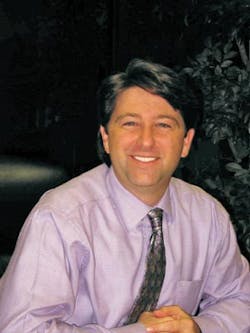Reinventing Million Air
HOUSTON - Roger Woolsey, the long-time charter pilot (11,000 hours) who acquired the Million Air Interlink franchise in 2002, has a disarming personality that appears to be serving him well as he steers the 29 companies in the franchise system. A boyish, endearing, 'tell me all about yourself' approach - along with what's called an honest effort for change - has employees and franchises following his call for more branding, sharing of information, and creating a common culture. In the end, he says, it should bring the increase in business everyone seeks.
The Million Air Interlink franchise of fixed base operations can be said, perhaps, to be entering it's own third wave. Initially, with the backing of the Dallas-based Mary Kay empire, it was all about marketing, under the direction of marketeer Ed Blair.
Recalls Woolsey, "If you were an independent FBO and competing against other FBOs on the field, putting the Million Air name up without a doubt was worth every penny. I say that because I was a franchisee who was paying a fee every month and it made a difference for me at Hobby Airport [acquired in 2000]."
In the 1990s, under the direction of Lou Pepper, now an owner with Atlantic Aviation, it became more static, more administration of what was in place, as business aviation was healthy.
Woolsey has led an initiative to educate and train systemwide in an effort to help all 29 locations build off of each other, while creating a more common culture in the process, one that doesn't take away the uniqueness of the independent FBO.
Says Woolsey, "One of the greatest assets we have is that we have 29 locations that are independent owners, which is an incredible asset to have. At the same time, one of our greatest challenges is that we have 29 independent owners. How do you make a common company, a common brand, a common feel and delivery system to our customer with that type of dynamic?"
Acquiring Interlink: 'I was naive'
In the early days of the Million Air sign-up of franchises, one criticism was that not all locations were on a par when it came to facilities and service. Later, some franchisees were disenfranchised as they sought more from Interlink. When asked about this history, Woolsey answers, "I want you to write just what you are saying. You understand. We have a bunch of alphas in our organization; I was one of those alphas just like all the others in the group."
Subsequently when asked if he bought what he thought he bought when he acquired Interlink, he responds: "I would say I was naive. I didn't know what I was getting into, or buying; but that's good and bad.
"We have so many opportunities that I never saw when I bought it, so that's a fantastic surprise. We didn't quite see the challenges at first; we've overcome those challenges.
"It's not that we were broken four or five years ago, it's just that we weren't living up to our potential. We knew that we wanted to be the premier FBO chain. What we didn't have real clear in our mind was that we were a franchise system. So, the first year we went on a quest."
That meant going on the road and visiting the various FBOs in the Million Air system, recalls Woolsey. He wanted to know what employees at the FBOs knew of the other franchises in the system, what they knew of the overall brand they were selling.
Defining the brand, the culture
Recalls Woolsey about his FBO visits, "What was shocking was that the average staff member at the time could name seven of the sister operations. That was sad; my store had the same problem. It was a real eye-opener for me." It led to a systemwide education and training initiative about what the entire system had to offer the customer. "We had to design the brand," explains Woolsey. "If you want to design the outcome, you need to build a design for it. Cultures can be designed for, or cultures can just happen."
Meanwhile, explains VP of marketing and customer relations Sandy Nelson, about building a culture, "We chose not to look within the industry, but to look outside. Roger talked with top leaders in various industries that were successful in creating and changing cultures. As a group, that helped us to define and design the culture that Million Air wants." At the same time the company used the Malcolm Baldridge national quality award as a guiding standard.
Central to this reinventing of the Million Air franchise, say Nelson and Woolsey, has been putting into place a communications system that has all 29 FBOs in touch with the others. "We train daily and we share information daily," says Nelson.
Today, says Woolsey, employees know all FBOs in the system. "When we find out you're headed for St. Louis, we can tell you to go see Cindy and Ron and we'll be happy to set everything up in advance for you," he says.
"Being able to connect through daily communications, through culture and a value system, really connects the dots. It's far more powerful."
